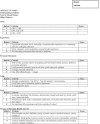Creating an Undergraduate Research Program in Otolaryngology-Head and Neck Surgery (Oto-HNS) for Students Underrepresented in Medicine
- PMID: 38887403
- PMCID: PMC11180065
- DOI: 10.1007/s40670-024-02021-z
Creating an Undergraduate Research Program in Otolaryngology-Head and Neck Surgery (Oto-HNS) for Students Underrepresented in Medicine
Abstract
Objectives: To report implementation and outcomes associated with a novel paid Summer Undergraduate Research Education Program (SREP) over the first 2 years in an academic otolaryngology program recruiting students underrepresented in medicine (URiM).
Methods: A 10-week program including a research bootcamp, curriculum, mentoring, and clinical shadowing was created. Grant funding to provide salary and support for transportation, conference attendance, and graduate school preparation or applications was procured. Primary objectives included (1) development of successful mentorship relationships; (2) increasing student-reported outcomes using pre- and post-program surveys to assess confidence, career planning, and overall satisfaction; (3) increasing exposure to medicine; (4) completion of an oral presentation; and (5) submission of a manuscript. Secondary objectives included abstract submission and completion of a graduate exam course or graduate school applications. Tertiary objectives included conference attendance and graduate school matriculation.
Results: One hundred thirty-five total applications were reviewed (89 from year 1 and 46 from year 2). Twelve students were interviewed for 3 spots in year 1, while 11 students were interviewed for 6 spots in year 2 (median application score, 9.25 (range, 1-14); median interview score, 8.7 (range, 5.4-10); acceptance rate, 6.7% (9/135)). Students met all primary objectives. Mean program survey scores increased from 3.8 to 4.77 (p < 0.0001). Eight of nine students submitted an abstract to a national conference, with five of eight students accepted for a presentation. Two students were accepted into graduate school, while five others are on track for graduate school application.
Conclusion: Identifying mentors, curriculum, and opportunities to meaningfully strengthen graduate school applications for URiM students through a clinically rigorous, financially supported, and research-focused summer program in an academic otolaryngology program is feasible and may be an effective means of increasing diversity in medicine and otolaryngology.
Supplementary information: The online version contains supplementary material available at 10.1007/s40670-024-02021-z.
Keywords: Diversity; Mentorship; Otolaryngology; URiM; Undergraduate; Underrepresented.
© The Author(s) under exclusive licence to International Association of Medical Science Educators 2024. Springer Nature or its licensor (e.g. a society or other partner) holds exclusive rights to this article under a publishing agreement with the author(s) or other rightsholder(s); author self-archiving of the accepted manuscript version of this article is solely governed by the terms of such publishing agreement and applicable law.
Conflict of interest statement
Conflict of InterestThe authors declare no conflict of interests.
Figures
References
-
- Marrast LM, Zallman L, Woolhandler S, Bor DH, McCormick D. Minority physicians’ role in the care of underserved patients. iversifying the physician workforce may be key in addressing health disparities. JAMA Intern Med [Internet] 2014;174:289–91. doi: 10.1001/jamainternmed.2013.12756. - DOI - PubMed
-
- O’Brien EK, Douse DM, Bayan SL, Stokken JK, Van Abel KM. Increasing the number of Black otolaryngologists [Internet]. Otolaryngologic Clinics of North America. 2021. p. 457–70. Available from: 10.1016/j.otc.2020.11.017. - PubMed
LinkOut - more resources
Full Text Sources
Miscellaneous




